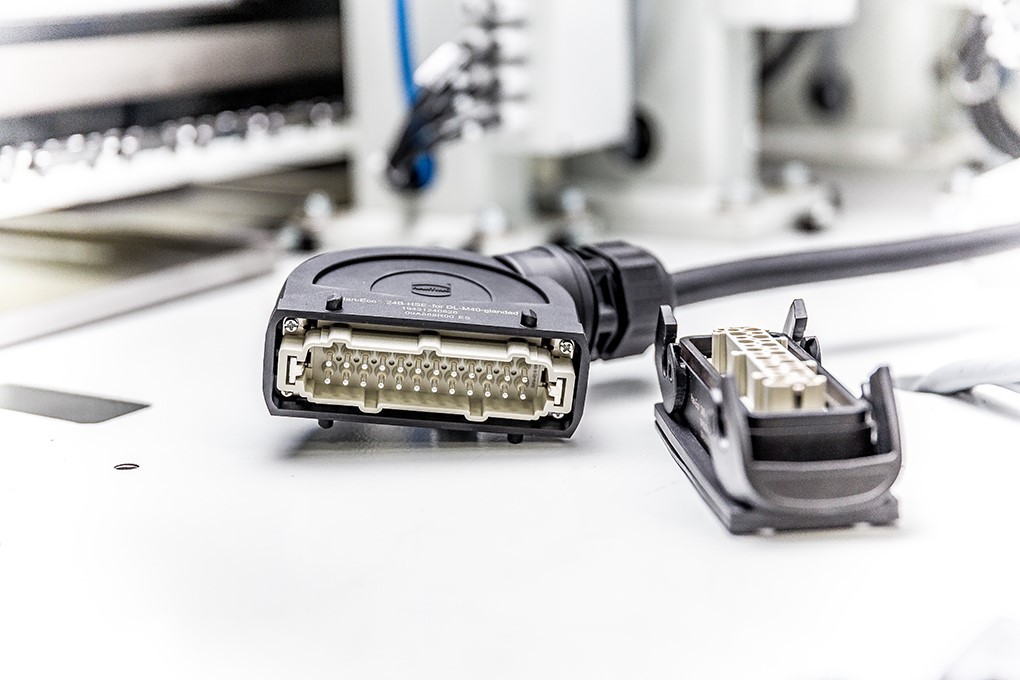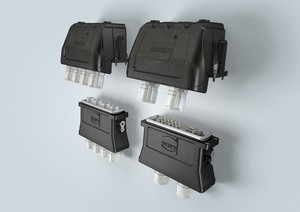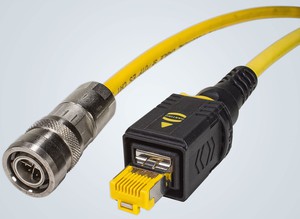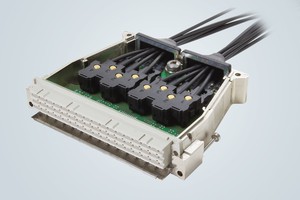

|
Edward Lowton
Editor |


|
| Home> | Plant, Process & Control | >Cables & Connectors | >Connector solutions for rail industry |
Connector solutions for rail industry
15 January 2019
The latest connector solutions and products from Harting are targeted at the rail industry and focus on weight reduction, easy handling and increasing data throughput.

For trains and trams, the continuous transition from metal to plastic can reduce the weight of connector housings by up to 50% from one generation to the next.
In line with this trend, Harting has extended its Han-Eco plastic connector series by adding housings in Han B size which are plug-compatible with Han connectors in metal housings and offer additional installation flexibility.
The company's selection of contact inserts for industrial connectors includes more than 100 different modules and at least as many monoblocks are available for the transmission of power, data, signals and compressed air.
The plastic housings are not only lightweight, they can be mounted quickly. The Han-Eco B monoblocks and modular inserts can be pre-assembled and snapped directly into the mounting housing, easing assembly by allowing harnesses and control cabinets to be prepared separately for final assembly.
More functions in a smaller space
By using smaller connectors, including modular types, more functions can be combined in a smaller space. This not only reduces the weight of the connectors, but also their space requirements. This gives users more flexibility when designing rail vehicles and opens up further opportunities to save costs in this area.
As a result, Harting has developed the High Pressure Railway (HPR) housing series, in which more connector modules are fitted into a single housing. One of the largest HPR housings, the Han 34 HPR, can now accommodate up to four 650A high-current contacts or 12 Han-Modular single modules. In the past, two housings each had to be equipped with six Han-Modular individual modules to supply a comparable data volume.
Another Harting solution that can help to reduce weight in railway applications is the Han 22 HPR Slim motor connector, which is particularly suitable for underfloor applications due to its compact, flat design. Through miniaturisation, Harting has succeeded in creating space for four contacts in the connector – without sacrificing performance.
Ethernet over Single Twisted Pair
In order to save weight and still be able to handle the same volume of data, Harting’s future rail technology offering will rely on Ethernet via Single Twisted Pair and small T1 connectors according to IEC 61076-3-125. For cable lengths up to 40 m, IEEE 802.3bp (1000 BASE-T1) can transmit 1 Gbit/s, using cable about one-third lighter than conventional 8-wire Ethernet cable. Commercially available Ethernet cable with four wire pairs for 1/10 Gbit/s Ethernet weighs about 45 kg per kilometre. A single-pair cable with the same bandwidth weighs only 30 kg per kilometre. Since several kilometres of cable are installed in the coaches of passenger trains alone, there is considerable potential for saving vehicle weight here.
Easy handling with tool-free assembly via PushPull
Harting offers its PushPull connector solutions in order to simplify assembly and service in the railway sector (Easy Handling) and make it more reliable. The M12 circular connector is now also available with PushPull locking. For device connection technology, there is also the easy-to-use PushPull system in the square connector variant 4. Both with M12 and with variant 4, the secure transmission of power, signals and data up to Cat.6A can be managed without problems.
The advantage of PushPull connectors is their tool-free installation, regardless of whether round or square versions are used. They are simply gripped and mated. An audible click signals that the connectors have been securely locked and correctly connected – and thereby saves up to 75% of assembly time.
Service-friendly drive control with the Multifibre module
In trains, IGBT semiconductor elements control high-performance electric drives, which are connected to the required insulation via plastic fibre optic cables. Harting now offers users a miniaturised solution in IGBT control: the Multifibre module, based on a transmission principle that includes the transfer of the transceivers of the controller board into a pluggable module, thereby integrating the optical interface according to the principle of 'plug electrically and transmit optically'. Only a robust interface rather than up to 16 sensitive optical contacts will need to be accessed for maintenance purposes.
- Register for HARTING’s industrial technology webinars
- Warehousing & logistics RFID
- Compact connector offers current-carrying capacity of more than 100A
- HARTING to showcase latest products at Drives & Controls 2020
- Quick switch
- Interactive connector selection
- EtherCAT connectivity added to industrial computer architecture
- PushPull connectors
- Flexible M12 cabling and connector solutions
- Versatile RFID transponders
- Close collaboration key to complex cable installation
- Contact inserts added to connector range
- Specialist distributor award
- Universal cable entry system
- Flexible driver connection for long travel lengths
- 'Multi-pole combination connector for power and signals
- Connectors for harsh environments
- Spring pressure speeds installation
- Connectors: 100% tested
- Cable trails and tags




















